What often develops in families where one child has ADHD (or one adult for that matter) is what I call the Big Struggle. The child with Attention Deficit Hyperactivity Disorder (ADHD) chronically fails:
- to meet obligations,
- do chores,
- stay up with schoolwork,
- keep to family schedules.
- get out of bed on time,
- arrive home on time,
- be ready to leave the house on time,
- keep his or her room tidied and,
- doesn’t cooperatively participate in family life, and, in general,
- “get with the program” at home
What Happens When A Child Doesn’t Cooperate?
The behavior described above leads to the big struggle. The parents set chronic limits with increasingly stringent penalties and increasingly tight limitations on the child. This, in turn, makes the child more defiant, less cooperative, and more alienated. As a result, the parents feel more exasperated with what increasingly appears to be an attitude problem, under voluntary control, rather than the neurological problem of ADHD.
As parents become more fed up with the child’s behavior, they become less sympathetic to whatever excuses or explanations the child may offer. Furthermore, they’re less willing to believe in promises to do better. This leads to stricter consequences in a usually futile effort to control the child’s behavior. Gradually, the child’s role in the family solidified around being the “problem child.” Consequently, he or she becomes the designated scapegoat for all the family’s conflicts and problems.
The Designated Scapegoat
There’s an old saying about scapegoating that the process requires a mob and a volunteer. In the case of the Big Struggle, the family forms the mob, and the ADHD behavior volunteers the child. Virtually anything that goes wrong in the family gets blamed on the ADHD child. Over time the child is draped with a kind of blanket of derision and scorn that smothers his or her development of confidence and self-esteem.
Quashing the Big Struggle takes work – work on a daily basis. Like weeds, it will come back if allowed to.
Here are some tips on quashing the big struggle:
- Get an accurate diagnosis. This is the starting point of all treatment for ADHD.
- Educate the family. All members of the family need to learn the facts about ADHD. This is the first step in the treatment. Many problems will take care of themselves once all family members understand what is going on. The education process should take place with the entire family, if possible. Each member of the family will have questions. Make sure all these questions get answered.
- Try to change the family “reputation” of the person with ADHD. If you are expected to screw up, you probably will. While if you are expected to succeed, you just might. It may be hard to believe at first, but having ADHD can be more of a gift than a curse.
- Make it clear that ADHD is nobody’s fault. First of all, it is not Mom’s or Dad’s fault. Furthermore, it is not brother’s, sister’s or the grandparents fault. Finally, it is not the fault of the person who has ADHD. It is nobody’s fault. This is extremely important for the whole family to understand.
- Give everyone in the family a chance to be heard. ADHD affects everyone in the family; some silently. Try to let those who are in silence speak.
- Try to break the negative process and turn it into a positive one. Applaud and encourage success when it happens. Try to get everyone pointed toward positive goals, rather than gloomily assuming the inevitability of negative outcomes.
- Make it clear who is responsible for what in the family. Everybody needs to know what is expected of him or her. Everybody needs to know what the rules are and what the consequences are.
Learn more about balancing ADHD and the family, finding professional support, and how separating the person from the problem can help your family dynamic in my ADDitude article on: Make It A Family Affair.
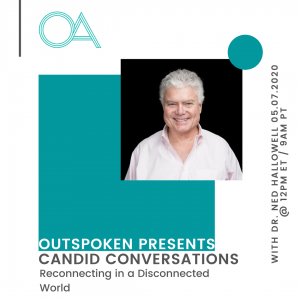
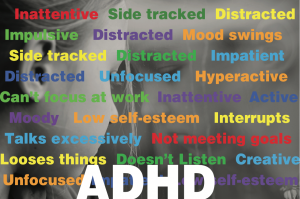 Although I’m known for talking about the advantages of having ADHD, in my YouTube video on
Although I’m known for talking about the advantages of having ADHD, in my YouTube video on 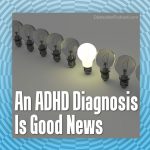 For a perspective on why “An ADHD Diagnosis is Good News,” listen to my Distraction podcast on the topic. You’ll learn why good things can happen when you get diagnosed with ADHD.
For a perspective on why “An ADHD Diagnosis is Good News,” listen to my Distraction podcast on the topic. You’ll learn why good things can happen when you get diagnosed with ADHD.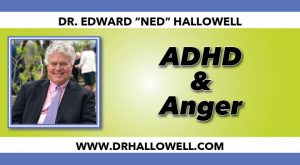
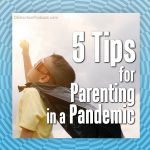
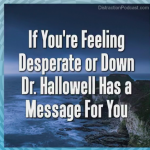 If you are feeling desperate, down, or full of pain right now, Dr. Hallowell shares in his podcast, some words of comfort with you through a “letter” he wrote a few years ago, after experiencing his own feelings of desperation.
If you are feeling desperate, down, or full of pain right now, Dr. Hallowell shares in his podcast, some words of comfort with you through a “letter” he wrote a few years ago, after experiencing his own feelings of desperation.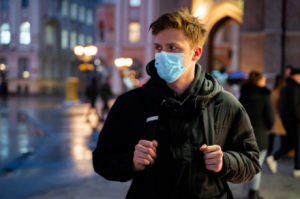 PY / WORKSHOPS
PY / WORKSHOPS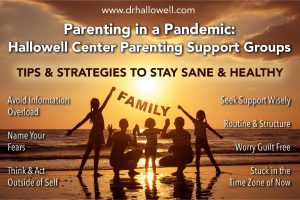 Parenting in a Pandemic
Parenting in a Pandemic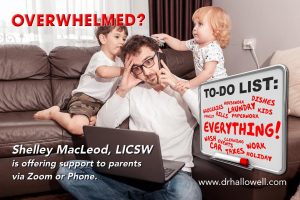
 For Teenagers
For Teenagers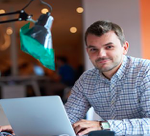
 Support Groups For Professionals
Support Groups For Professionals





